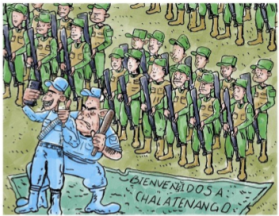On International Workers Day, Labor Leaders Took To Social Media In Protest
In light of the Salvadoran government’s strict national quarantine to combat COVID-19, this was the first year in decades that the Salvadoran labor movement did not take to the streets en masse on International Workers Day to vindicate working class demands.
Instead, the Trade Union Confederation of Workers of El Salvador (UNTS), joined by La Vía Campesina, National Health Forum and university student organization ‘Roque Dalton University Front’ (FURD) organized a digital cacerolazo (clanging of pots and pans) on May 1 to protest President Nayib Bukele’s response to the pandemic.
People from all walks of life participated in the online protest. With hashtags #LaClaseTrabajadoraHaceLaRiqueza (the Working Class Creates The Wealth) and #NoAlPlanDeAjusteDelFMI (No To The IMF Structural Adjustment Plan), unions and campesinx organizations denounced the coming wave of international loans that the Bukele administration is negotiating and the conditions that usually come along with them. If the International Monetary Fund’s current recommendations for El Salvador are any indication, the labor movement will be fighting impositions like a hiring freeze in the government and increases in consumer taxes on basic goods, including groceries.
Contrary to the measures proposed by the IMF and other international financial institutions, the Salvadoran working class is demanding a cessation of mass layoffs in the public sector, respect for collective bargaining and increased taxation on the rich to fund healthcare programs. They are also demanding the approval of the General Water Law and Food Sovereignty Law that have languished in the legislature for years, and if approved, would guarantee the human right to water and local food to working class Salvadorans.
As a net importer of food, El Salvador has struggled to quickly respond to the food insecurity brought on by the national quarantine measures. Compounding this issue of food insecurity is a lack of access to safe, potable water in the country. Only 32% of households in rural areas have access to running water, making it difficult for many people in El Salvador to comply with even the most basic global health recommendations for preventing the spread of COVID-19.
While El Salvador’s social movement, which has historically underutilized digital organizing, took to online platforms to protest, a few pro-Bukele unions took to the streets to express their support for the government despite militarily enforced stay-at-home orders.
In an early morning interview on May 1, the Minister of Justice and Public Security, Rogelio Rivas, expressed that the government would dissolve the public demonstration scheduled to happen later that day. But that never came to pass.
Instead the National Civil Police monitored and accompanied the street demonstrators. With pro-government banners and posters declaring “We support the sanitary measures of President Nayib Bukele” and “Rolando Castro, the workers are with you,” the pro-Bukele union leadership was praised and received by Minister of Labor Rolando Castro at the Ministry of Labor to hand-deliver a list of demands for what the unions expect after emergency measures are lifted. In addition, with some of these union representatives at his side, Castro announced the creation of a Union Leadership Training Institute to “promote a purposeful movement and cultural awareness of the business sector.”
Marielos de León criticized the Bukele administration’s double standards. “This government, which imposes measures on us that are not preventive but rather repressive, has allowed, in the midst of this national quarantine, a small group to take to the streets with posters and banners stating that the working class gives their total support to President Bukele,” she told CISPES in an interview. “We want to say that they do not represent actual workers and that the true working class believes that the fight will continue from our homes.” The divisions and hostility that the Bukele administration and Minister of Labor Rolando Castro have been actively stoking since the fall were evident on May 1. For example, several leaders of the Salvadoran Social Security Institute Workers Union (STISSS), the largest union in the country, who participated in the pro-Bukele street march are considered illegitimate by many rank-and-file union members.
On September 4, 2019, Minister of Labor Castro illegally transferred temporary leadership credentials from the union’s outspoken, left-leaning Executive Board, which had been democratically elected in December 2018 to a minority group within the union, led by Ricardo Jesús Monge Cornejo. On December 13, 2019, the STISSS held a leadership election, in which the displaced Executive Board won re-election by a landslide with 790 votes, while the slate of candidates that included Ricardo Monge only garnered 22. Nonetheless, the Ministry of Labor recognized Monge as the new Secretary General, effectively installing pro-government leadership that can now be called on to take to the streets in support government policies on behalf of organized labor.
Actions like these, coupled with given the President and his supporters’ frequent online attacks against the opposition, especially women, led some social movement organizations to hold back from joining the May 1 online protest out of fear of retaliation, reports de León.

 "I am a CISPES supporter because continuing to fight for social justice and a more people-centered country means continuing the dream and sacrifice of thousands of my fellow Salvadorans who died for that vision.” - Padre Carlos, New York City
"I am a CISPES supporter because continuing to fight for social justice and a more people-centered country means continuing the dream and sacrifice of thousands of my fellow Salvadorans who died for that vision.” - Padre Carlos, New York City

